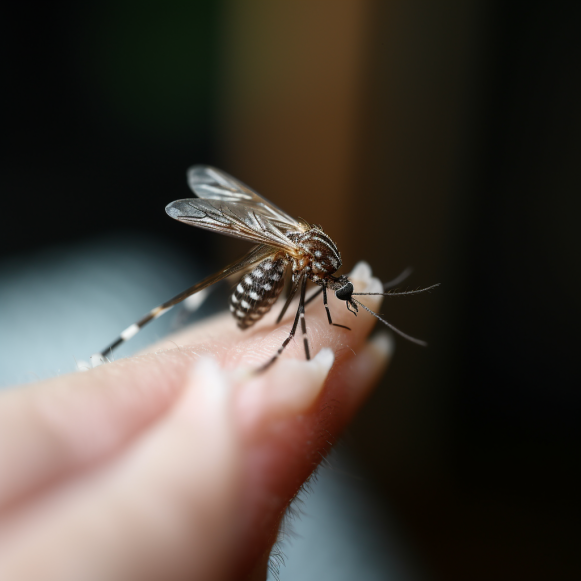Mosquitoes are annoying and some are deadly. Here’s why we can’t – and shouldn’t – simply kill them all

We’re all familiar with the sounds of summer at this point in the year: the breeze through the trees, birdsong, the chatter of children playing outside – and the persistent buzz of a mosquito.
These insects have been nibbling on us since the beginning of time. With those bites came a slew of diseases transmitted by viruses and parasites, including malaria, West Nile, Zika, dengue, and others.
Mosquitoes are the world’s deadliest animal, according to the Centers for Disease Control and Prevention, and they kill hundreds of thousands of people each year. When you factor in global warming caused by climate change, the problem may worsen.
We have some issues with our tiny bloodthirsty neighbors, and it may appear that getting rid of them would eliminate a source of annoyance while also saving lives.
But could we just get rid of them all? We consulted the experts.
Some mosquitos are actually beneficial.
The first issue to address is the word “all.” There are over 3,000 mosquito species recognized worldwide.
“And each of those mosquitoes is very different in terms of their ecology, the places where they live, whether they bite people, frogs, or birds,” says Kristen Healy, an assistant professor in Louisiana State University’s Department of Entomology. “So, depending on the mosquitoes we’re talking about, their entire ecological cycle is very different.”
Given this diversity, there are numerous ecological cycles – or the interactions between species and their surroundings – to consider.
RELATED: Additional mosquito sprayings have been ordered in Santa Clara County due to positive West Nile virus tests.
Healy, who is also the president of the American Mosquito Control Association, cited Louisiana as an example, which has many swamps where mosquitoes thrive. “Those mosquitoes could play an important role in the ecology of those swamp life cycles, feeding fish and other small invertebrates in the aquatic system.” And possibly other small animals (mosquitoes) that feed on the adults.”
Other mosquitos may play similar roles in their native habitats, so complete eradication may have unintended consequences. Furthermore, experts say it’s unlikely that we’d be able to completely eradicate mosquitos due to their massive (think hundreds of billions) and widespread population.
However, we do not have to eliminate all mosquitos.
It turns out that the species we’re most familiar with – the ones that cause all those itchy, red bumps and the more notorious diseases – are few and far between.
“Eradication of all mosquitoes would likely have an impact on the food chain,” says Laura Harrington, professor of entomology at Cornell University. The extinction of one or two species would most likely have no effect.”
So, who’s the issue?
To be specific, the Aedes, Anopheles, and Culex genuses. Those genuses’ species can each transmit multiple viruses or parasites. Anopheles transmits malaria, Culex transmits West Nile, and the Aedes genus alone transmits yellow fever, chikungunya, dengue, and Zika, among other diseases.
And they might not be necessary in our ecosystems.
“Disease-carrying mosquitos, such as Aedes aegypti and Aedes albopictus, are invasive in many parts of the world.” “We were fine without them,” John Marshall, a biostatistics and epidemiology professor in residence at the University of California, Berkeley, told CNN.
“There are thousands of species of mosquitoes, only a few of which transmit human pathogens, so if disease-transmitting species were eliminated, non-disease-transmitting species would often be available to fill their ecological niches.”
“Disease-transmitting mosquitoes have been eliminated from many parts of the world throughout history,” Marshall added, “so local elimination is certainly possible.”
Healy also mentioned that these species have “a very close relationship” with the viruses or parasites they carry. That is, while sister species could theoretically mutate and become capable of transmitting the same diseases, it is unlikely that completely unrelated species would suddenly become carriers if the problem ones were eradicated.
In the United States, Culex mosquitoes, specifically the common house mosquito, are a major target for control efforts. These mosquitos prefer to feed on birds, where they pick up West Nile virus, and humans are “accidental hosts,” according to Healy. However, as larvae and pupae, these mosquitos thrive in highly polluted environments such as septic tanks, retention and detention ponds, and anywhere there is sewer runoff.
The other type of mosquito being targeted in the United States are those that live in your backyard, such as the Asian tiger mosquito (Aedes genus). “They live in backyard containers, such as tires, watering cans, and bird baths” early in their life cycle.
Importantly, those ecosystems do not have many other species that could be affected, so eliminating those specific mosquito species would not disrupt the natural balance, according to Healy.
Things are a little different with Anopheles mosquitos, which transmit malaria. They prefer swamps, which have a much more diverse ecosystem, according to Healy.
“If you were to go out and target the larvae of that species, you’d have to really think about what types of products you’d be using in those environments,” she explained.
While some recent cases of malaria have made headlines, the disease is still uncommon in the United States.
What are we attempting?
The days of problematic chemicals with unintended ecosystem effects are over, according to experts, and control strategies are becoming increasingly specialized.
“For example, some success has been achieved with Wolbachia (a bacterial infection of mosquitoes) as a tool to’sterilize’ the Aedes aegypti mosquito (a major vector of dengue, Zika, and yellow fever viruses),” Harrington explained.
For example, Wolbachia has been used to sterilize male mosquitos. The bacteria also prevents viruses that cause Zika, dengue fever, yellow fever, and chikungunya from replicating within the Aedes aegypti mosquito.
Other promising strategies, such as sterilizing mosquito populations, are being developed through gene editing. Other options include using non-chemical methods to kill immature mosquitos, such as bringing in fish to eat the larvae, setting sugar traps, and using drones to locate stagnant water for removal, according to Healy.
However, there is no denying that we have not yet won the war.
“It has been challenging,” Harrington admitted. “Mosquitoes have short generation times and can mutate, adapt, and change in response to certain strategies.” Furthermore, much remains unknown about their basic biology and behavior, which is critical to developing effective methods of eradication.”
“Much research is needed to develop and evaluate tools that are affordable and acceptable, particularly to those in resource-poor settings who bear the greatest burden of disease,” she added.
Education about mosquito control is also important; improper use of sprays, for example, can harm other insects such as bees. “But, thankfully, those misapplications are not the norm,” said Healy, who has studied these practices in collaboration with the beekeeping industry.
“For over a century, we’ve had organized mosquito control. And our research with the USDA bee lab shows that there are more serious threats to honey bee health. We are constantly educating mosquito control personnel on these best practices. And we don’t expect any harm to these insects if we follow through.”
What are our options now?
Is it possible to get rid of the worst mosquitoes that bother us? Yes. However, it will take time.
For the time being, here’s what experts recommend to stay safe:
- To stay informed about mosquito-borne risks, visit your local health department’s website or the CDC’s traveler health website.
- Use repellents that have been approved by the EPA.
- When going outside, wear light, loose-fitting clothing with long sleeves and pants if possible.
- Secure your doors, windows, and screens to prevent mosquitos from entering through cracks or tears.
- When visiting areas where disease-carrying mosquitos are present, purchase a bed net.
- Check your backyard for standing water once a week; empty any buckets or trash cans after rain or watering.






